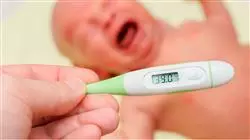University certificate
The world's largest faculty of nursing”
Introduction to the Program
With this intensive program you will be able to explain the biomarkers used in the clinical diagnosis of infectious diseases"

Infectious Diseases are a basic pillar of healthcare both in terms of individual health and public health worldwide. Today, for example, we can see how COVID 19 infection is revolutionizing the entire world, involving all healthcare professionals who, in one way or another, may have contact with the coronavirus.
Nurses are professionals who are on the front line in the care of any pathology, and in the case of infections, it could not be otherwise. Therefore, they need to have a broadly up-to-date knowledge of new developments in the care of patients with different types of infections. One of the main reactions of these pathologies is fever and its correct management becomes essential to achieve the patient's improvement.
As in most specialties, in the case of infectious pathology, the performance of the clinician in the Emergency Department is sometimes complex and, on many occasions, decisive in the morbidity and mortality of patients. Therefore, it is essential to establish updating tools for health professionals who have to deal with Infectious Diseases outside specialized units and services.
Specifically, this program includes classic aspects in the management of infectious pathology by apparatus or organs, incorporating new items for a correct management of Infectious Diseases in the current scenario of globalization of health. An important part of the program covers the concept of prevention of risks derived from the care of Infectious Diseases for both healthcare personnel and the population, going deeper into the measures that can be adopted in Emergency Departments to minimize them. In addition, there will be a space to learn about the current profiles of the population that most frequently attends Emergency Departments, in which the delay in action can mean a significant variability in the prognosis: multi-pathological, immunosuppressed, institutionalized, onco-hematological, etc. patients. The student will also be able to learn about pediatric pathology with this Postgraduate diploma
On the other hand, being a 100% on line training, the professional will have the ability to decide when and from where to study, without commitments or obligations, thus being able to combine their study time with the rest of their daily obligations.
The specialization of nurses in the field of fever management is a great asset to their CV, as it is one of the main tasks that they will have to perform in the Emergency Department"
This Postgraduate diploma in Fever Management in the Emergency Department for Nursing contains the most complete and up-to-date scientific program on the market. The most important features of the program include:
- The development of clinical cases presented by experts in Fever Management in the Emergency Department.
- The graphic, schematic, and eminently practical contents with which they are created, provide scientific and healthcare training on those disciplines that are essential to professional practice.
- New therapeutic developments in the management of fever.
- Practical exercises where to carry out the self-assessment process to improve learning
- An algorithm-based interactive learning system for decision-making in the clinical situations presented throughout the course. Its special emphasis on research methodologies
- Theoretical lessons, questions to the expert, debate forums on controversial topics, and individual reflection assignments
- Content that is accessible from any fixed or portable device with an Internet connection
This Postgraduate diploma is the best investment you can make in the selection of a refresher program for two reasons: in addition to updating your knowledge in Fever Management in the Emergency Department for Nursing, you will obtain a certificate from TECH Global University"
It includes, in its teaching staff, professionals belonging to the field of nursing, who bring to this training the experience of their work, in addition to recognized specialists from leading scientific societies.
The multimedia content, developed with the latest educational technology, will provide the professional with situated and contextual learning, i.e., a simulated environment that will provide an immersive training experience designed to train for real-life situations.
The design of this program focuses on Problem-Based Learning, by means of which the nurse must try to solve the different professional practice situations that arise throughout the academic year. For this purpose, the professional will be assisted by an innovative interactive video system developed by recognized experts in the management of fever and with great teaching experience.
Immerse yourself in the study of this Postgraduate diploma and improve the care of your patients with infectious pathologies”

Prepare yourself with the best teaching methodology of the moment and acquire a specialization of the highest academic level that will allow you to increase your training and patient care”
Why study at TECH?
TECH is the world’s largest online university. With an impressive catalog of more than 14,000 university programs available in 11 languages, it is positioned as a leader in employability, with a 99% job placement rate. In addition, it relies on an enormous faculty of more than 6,000 professors of the highest international renown.

Study at the world's largest online university and guarantee your professional success. The future starts at TECH”
The world’s best online university according to FORBES
The prestigious Forbes magazine, specialized in business and finance, has highlighted TECH as “the world's best online university” This is what they have recently stated in an article in their digital edition in which they echo the success story of this institution, “thanks to the academic offer it provides, the selection of its teaching staff, and an innovative learning method aimed at educating the professionals of the future”
A revolutionary study method, a cutting-edge faculty and a practical focus: the key to TECH's success.
The most complete study plans on the university scene
TECH offers the most complete study plans on the university scene, with syllabuses that cover fundamental concepts and, at the same time, the main scientific advances in their specific scientific areas. In addition, these programs are continuously being updated to guarantee students the academic vanguard and the most in-demand professional skills. In this way, the university's qualifications provide its graduates with a significant advantage to propel their careers to success.
TECH offers the most comprehensive and intensive study plans on the current university scene.
A world-class teaching staff
TECH's teaching staff is made up of more than 6,000 professors with the highest international recognition. Professors, researchers and top executives of multinational companies, including Isaiah Covington, performance coach of the Boston Celtics; Magda Romanska, principal investigator at Harvard MetaLAB; Ignacio Wistumba, chairman of the department of translational molecular pathology at MD Anderson Cancer Center; and D.W. Pine, creative director of TIME magazine, among others.
Internationally renowned experts, specialized in different branches of Health, Technology, Communication and Business, form part of the TECH faculty.
A unique learning method
TECH is the first university to use Relearning in all its programs. It is the best online learning methodology, accredited with international teaching quality certifications, provided by prestigious educational agencies. In addition, this disruptive educational model is complemented with the “Case Method”, thereby setting up a unique online teaching strategy. Innovative teaching resources are also implemented, including detailed videos, infographics and interactive summaries.
TECH combines Relearning and the Case Method in all its university programs to guarantee excellent theoretical and practical learning, studying whenever and wherever you want.
The world's largest online university
TECH is the world’s largest online university. We are the largest educational institution, with the best and widest online educational catalog, one hundred percent online and covering the vast majority of areas of knowledge. We offer a large selection of our own degrees and accredited online undergraduate and postgraduate degrees. In total, more than 14,000 university degrees, in eleven different languages, make us the largest educational largest in the world.
TECH has the world's most extensive catalog of academic and official programs, available in more than 11 languages.
Google Premier Partner
The American technology giant has awarded TECH the Google Google Premier Partner badge. This award, which is only available to 3% of the world's companies, highlights the efficient, flexible and tailored experience that this university provides to students. The recognition as a Google Premier Partner not only accredits the maximum rigor, performance and investment in TECH's digital infrastructures, but also places this university as one of the world's leading technology companies.
Google has positioned TECH in the top 3% of the world's most important technology companies by awarding it its Google Premier Partner badge.
The official online university of the NBA
TECH is the official online university of the NBA. Thanks to our agreement with the biggest league in basketball, we offer our students exclusive university programs, as well as a wide variety of educational resources focused on the business of the league and other areas of the sports industry. Each program is made up of a uniquely designed syllabus and features exceptional guest hosts: professionals with a distinguished sports background who will offer their expertise on the most relevant topics.
TECH has been selected by the NBA, the world's top basketball league, as its official online university.
The top-rated university by its students
Students have positioned TECH as the world's top-rated university on the main review websites, with a highest rating of 4.9 out of 5, obtained from more than 1,000 reviews. These results consolidate TECH as the benchmark university institution at an international level, reflecting the excellence and positive impact of its educational model.” reflecting the excellence and positive impact of its educational model.”
TECH is the world’s top-rated university by its students.
Leaders in employability
TECH has managed to become the leading university in employability. 99% of its students obtain jobs in the academic field they have studied, within one year of completing any of the university's programs. A similar number achieve immediate career enhancement. All this thanks to a study methodology that bases its effectiveness on the acquisition of practical skills, which are absolutely necessary for professional development.
99% of TECH graduates find a job within a year of completing their studies.
Postgraduate Diploma in Emergency Fever Management for Nursing
The Postgraduate Diploma in Emergency Fever Management for Nursing is an academic program designed to provide nurses with the tools necessary to effectively assess, diagnose and treat patients with fever in an emergency situation. Fever is one of the most common presenting symptoms in the emergency department and can be indicative of a wide range of diseases and medical conditions. Therefore, it is critical that nurses are trained to effectively address this symptom and provide appropriate care to patients. In addition, issues related to the evaluation and differential diagnosis of the causes of fever, including infections, inflammatory diseases, endocrine disorders and neoplasms, will be addressed. Participants will learn to identify warning signs that indicate the need for urgent care and establish an appropriate care plan for each patient.
Learn and specialize with the best
A highlight of this program is the variety of technological resources for learning. Participants will have access to online resources, such as recorded lectures and updated bibliography, which will complement the classes and facilitate continuous learning. At TECH we are ranked by Forbes as the best university in the world, which is why thousands of students trust us. The Postgraduate Diploma in Emergency Fever Management for Nursing is an excellent opportunity for Nursing professionals who wish to specialize in the management of this common symptom in emergency situations. In addition, this academic program can serve as a solid foundation for those looking to advance their careers and pursue graduate programs in emergency or critical care Nursing. Don't miss this opportunity to improve your skills and knowledge in emergency fever management!







